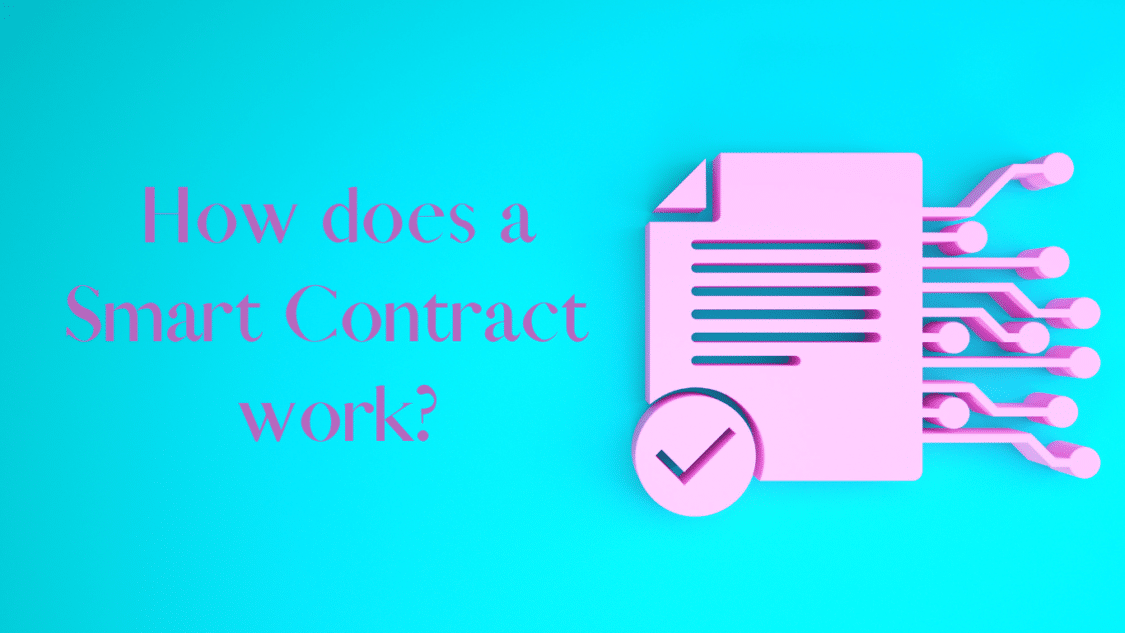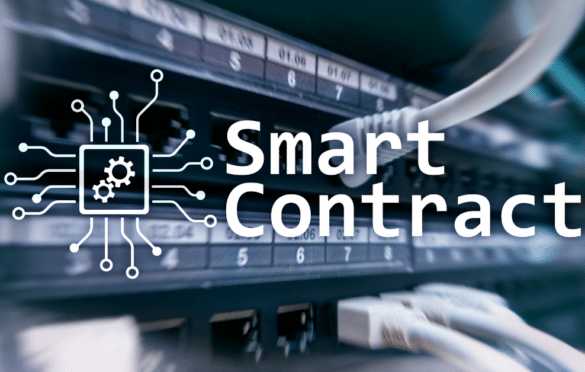Smart contracts are a form of automated agreement between the contract creator and the recipient. The agreement is written in code format and stored in the blockchain system. When locked into the blockchain system, it cannot tamper with; therefore, the recipient can rest assured that the smart contract remains irreversible. Smart contracts, popularized by Ethereum, the world’s second most popular blockchain, have led to many decentralized apps (DApps) and other use cases on the network.
History of smart contracts:

Smart contracts have long predated blockchain technology. The idea was founded in the 1990s by cryptographer Nick Szabo. Szabo had developed a digital currency called Bit Gold that has yet to launch officially. This type of bitcoin highlighted the smart contract case – people can do these online transactions.
Many have seen these contracts to be similar to vending machines. They provide the user with the product without using a person. These contracts serve the same purpose but are known to be more versatile. Over time smart contracts have advanced. They have been created without coding skills since the platform’s creation. They’re improving security by utilizing other programming languages, developing alternatives such as hidden contracts, and devising ways to automatically record its history in a human-readable manner, which is far simpler to understand than using the blockchain.
How does a smart contract work?

Smart contracts can be compared to “if-then” statements between two parties. If one person’s needs are met, the agreement is settled, and the contract is considered official. They work just as well for bigger masses, such as government mandates and retail systems. Breaking down the idea of smart contracts, the first step is the agreement between the parties. Once the two agree on the conditions, the smart contract is complete. The details are then recorded into the smart contract, encrypted, and stored in the blockchain network. Once the contract is completed and uploaded into the system, all the nodes must update the blockchain with this transaction, updating the network’s new “state”.
Smart contracts work by using computer code to automate the execution of an agreement between two or more parties. The code is stored on a blockchain network, which is decentralized, transparent, and secure.
When a smart contract is created, it contains the terms of the agreement, which are expressed as code. Once the terms are met, the contract automatically proceeds with the action, whether transferring funds, releasing data, or another event.
Smart contracts can be set up to interact with other smart contracts, creating a web of interconnected agreements. They can also be directed to react to external events, such as changes in market prices or weather conditions, enabling them to adapt to changing circumstances automatically. Overall, smart contracts provide a secure and efficient way to execute agreements without the need for intermediaries, reducing costs and increasing transparency.
What are the downsides?

While these contracts may seem like a great concept, it has their downsides, just like anything. Firstly, we must consider that smart contracts and blockchain networks are done manually; therefore, there is room for human error. That’s not even considering these autonomous agreements’ lack of regulatory certainty. On paper, the notion of a safe, simplified money transfer procedure sounds excellent, but people should consider taxation and other aspects.
There is also a long-standing scaling problem. Because blockchain networks have struggled to expand since their creation, transactions might take minutes, if not hours, depending on traffic. While this may appear to be a concern initially, initiatives like Ethereum 2.0 address it. Plus, a transaction that takes a few hours is still significantly faster than traditional fund transfers, which might take days.
What are the advantages?
Smart contracts offer many advantages. Firstly, smart contracts are self-executing as they can automate the process of executing and enforcing a contract. Secondly, smart contracts are transparent. All parties involved can see the terms and conditions. This helps build trust between parties and reduces the risk of fraud or disputes. The transparency of smart contracts also aids in increasing accountability, as all parties can be held to the terms of the contract.
Thirdly, smart contracts are known for their high level of security and immutability. They are stored on a blockchain, which provides a secure and tamper-proof environment for executing and storing contracts. Once a smart contract is completed, it cannot be played with, which helps to prevent fraud.
Finally, smart contracts offer a lot of flexibility. They can be designed to handle a wide range of transactions and can be customized to meet the specific needs of different parties. This flexibility helps ensure that all parties are satisfied with the terms of the contract and can make it easier to execute complex business transactions.
Overall, smart contracts offer several advantages, including automation, transparency, security, and flexibility. These advantages make smart contracts attractive for businesses and individuals looking to streamline their contract management processes and reduce the costs associated with executing and enforcing contracts.
What are some examples of smart contracts?
Smart contracts are used in various industries and applications to automate, streamline, and secure transactions. In the insurance industry, smart contracts can automate the claims process, reducing the need for intermediaries and improving efficiency. In real estate, smart contracts can be used to help process transactions and manage leases and rental agreements. Supply chain management can also benefit from smart contracts by tracking the movement of goods and products and increasing transparency.
Additionally, smart contracts can create and manage digital identities, providing a secure and decentralized way to verify and authenticate individuals and entities. Finally, smart contracts are essential to decentralized finance (DeFi) applications, enabling automated and trustless transactions between parties without intermediaries such as banks or exchanges. Overall, smart contracts have the potential to revolutionize many industries and applications, making transactions faster, cheaper, and more secure.
Can smart contracts only be created with Ethereum?
No, smart contracts can be created on various blockchain platforms, not only Ethereum. Although Ethereum is known for its support for smart contracts and has a more developed ecosystem for creating and deploying them, other blockchain platforms such as EOS, Tron, Cardano, and Binance Smart Chain also support smart contracts.
Developers can select the platform that best meets their needs because each has its own programming and tools for building and deploying smart contracts. Due to its first-mover advantage and thriving developer community, Ethereum is still the most popular platform for building and deploying smart contracts.
Is an NFT a smart contract?
An NFT (non-fungible token) is not a smart contract but can be built using its technology.
An NFT is a digital asset representing ownership of a unique item. An NFT can be a piece of artwork, music, or collectibles on a blockchain network. They are created by minting them on a blockchain, which generates a unique digital certificate of ownership that is one of a kind. The certificate cannot be replicated or duplicated.
NFTs can be developed using smart contract technology, enabling programmers to design specific rules for their ownership and transfer on the blockchain, even though they are not smart contracts. For instance, when an NFT is resold, a smart contract can impose an additional charge, guaranteeing that the NFT’s original developer gets a share of the transaction.
How are smart contracts different from traditional legal contracts?
Smart contracts have some key differences from traditional legal contracts. One of the most notable ones is in their execution. Traditional contracts require manual performance by the parties involved, while smart contracts are self-executing. A significant benefit of a smart contract is that it is automatically executed once certain conditions are met, eliminating the need for manual intervention.
Another key difference is the presence of a third party. Traditional legal contracts often require intermediaries, like a lawyer or notary. Their job is to pay attention to the execution and enforcement of the contract. Smart contracts, on the other hand, eliminate the need for intermediaries. This essentially reduces the cost and complexity of executing and enforcing contracts.
Transparency is another crucial difference between smart contracts and traditional legal contracts. Smart contracts are transparent. Transparency means all parties can see the contract terms and the execution process. Standard legal contracts can, in most cases, be difficult to understand without legal expertise.
In addition, smart contracts are immutable. Once executed, they cannot be altered or messed with. This contrasts traditional legal agreements, which can be amended or modified if all parties agree to the changes. Lastly, smart contracts can automate complex business processes without human interference, which can further streamline and simplify the execution and enforcement of contracts.
How are disputes or unexpected events handled in a smart contract?
One common approach to solving disputes is to use an escrow account, which holds funds or assets until certain conditions are met. Smart contracts can also use oracles, which are trusted external data sources. Oracles determine whether certain conditions have been met. Oracles can help to verify the result of an event or the price of a commodity. Multi-signature wallets are another approach, requiring some parties to sign off a transaction before being carried out. These wallets help ensure that all parties agree before the transaction is completed. Smart contracts can also be designed for a subject to change by the contract terms and if all parties agree to the changes.
In rare cases, disputes may need to be resolved through mediation or arbitration. Smart contracts can include provisions for these processes, such as specifying a trusted mediator or arbitrator. Smart contracts may handle conflicts and unexpected events more effectively and transparently than traditional legal contracts by utilizing some of these strategies. These methods can aid in ensuring that all parties are on the same page and that the contract is carried out fairly and openly.
What is the most popular smart contract?
Ethereum’s smart contract language, Solidity, is the most popular smart contract platform and is widely used by developers to build (dApps) on the Ethereum blockchain. Ethereum is a second-generation blockchain designed specifically to support smart contracts and decentralized applications. It currently has the largest developer community and the highest functioning ecosystem of dApps. Solidity is a high-level programming language that aids in writing smart contracts on the Ethereum network. Solidity is similar to popular programming languages like JavaScript and Python, which makes it accessible to many developers. While other blockchain platforms support smart contracts, such as EOS, Tron, and NEO, Ethereum’s network effect and developer community have made it the most popular smart contract platform to date.
Conclusion:
In conclusion, the idea of smart contracts contains a rich history that dates back to the early days of the Internet. The significance of smart contracts today cannot be emphasized, given their potential to transform various fields and applications, including supply chain management, real estate, banking, and insurance. Smart contracts can assist in eliminating intermediaries, cutting expenses, and increasing efficiency by enabling automated, trustless, and secure transactions. Smart contracts will probably become a more and more crucial part of the digital economy as blockchain technology develops and matures, opening up new opportunities for individuals and enterprises.
For more news updates, visit our homepage now and see our latest news article. Want to learn more about trading? Visit our education page now and learn for FREE!
What is a DApp?(Opens in a new browser tab)

